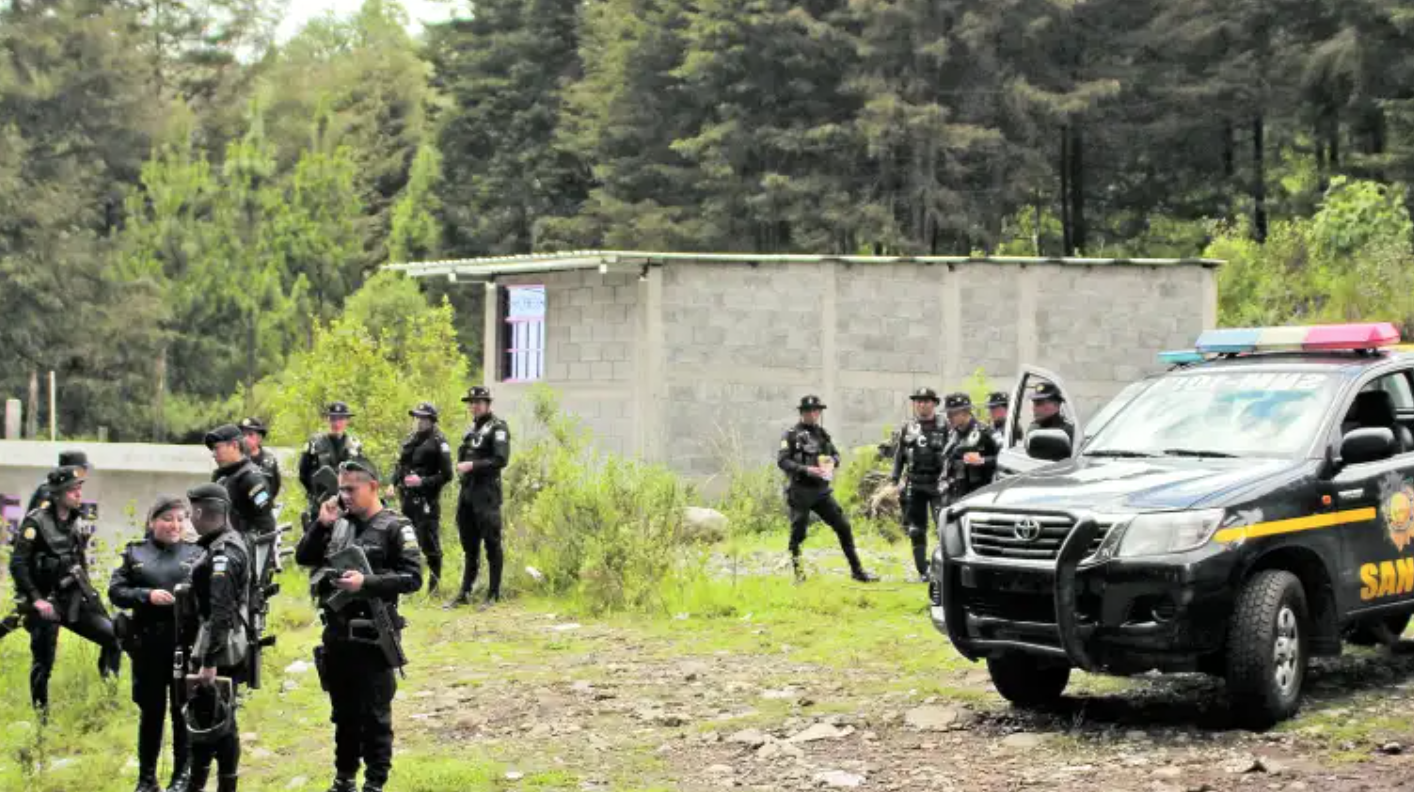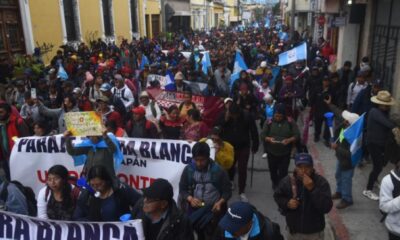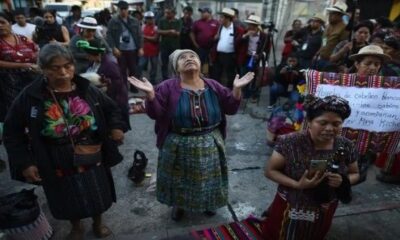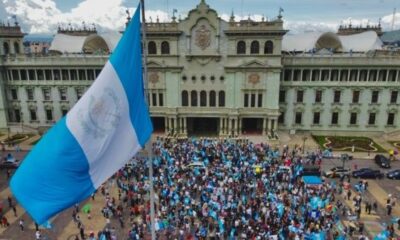International
Guatemalan prosecutors and justice operators lack security guarantees in province

October 24 |
The kidnapping 29 days ago of a prosecutor and two investigators from the Public Ministry (MP) in Tajumulco, San Marcos, reveals the vulnerability of the investigators in the province.
This situation is caused by several factors, such as insufficient support from the National Civil Police (PNC) and the dominance that criminal structures have over municipal and departmental authorities, according to a former secretary of the Public Prosecutor’s Office and an analysis of the situation by the Pro-Justice Movement.
On September 25, a prosecutor and two investigators from the Public Prosecutor’s Office (MP) were kidnapped by residents of the village of Tuinimá, Tajumulco, San Marcos, who demanded the closure of the municipal headquarters of the MP in Tajumulco and the release of two people linked to the crime of an army colonel.
As of yesterday, the MP workers had been in this situation for 28 days. According to the official report of the auxiliary of the Human Rights Ombudsman’s Office, the reason for the kidnapping is because the victims were carrying out a field inspection related to the theft of electricity.
“Being a prosecutor at the municipal or departmental level is different from being a prosecutor in Guatemala City,” says Javier Monterroso, ex-secretary of the MP, who affirms that the prosecutors and investigators assigned in the province work with many “precariousnesses” and normally only investigate common crimes, so as not to enter into confrontation with the inhabitants or put themselves at risk from organized crime.
“Their work is more complicated because there are fewer PNC agents and MP personnel, but in addition, many members of the security forces themselves are committed to the powers that be, politicians and drug traffickers,” Monterroso said.
He also states that in the province, municipal and departmental authorities depend a lot on the criminal structures in the region, and for this reason, when it comes to investigating criminal structures, prosecutors are asked not to be from the department so that there are no reprisals, and they opt to bring prosecutors from the capital city, in addition to the support of the army.
“But even so, prosecutors are very vulnerable because of the above situations and when they are retained by the population, they are tied up and beaten on the orders of community leaders or organized crime,” says Monterroso.
The former secretary of the MP says that even some of the workers who have been retained have said that they are subjected to psychological abuse, when they are threatened that they will be burned and “they show them or gasoline”.
Retention of personnel, according to Monterroso, has occurred most frequently when investigating illegal electricity connections or when tracking poppy plantations.
For Carmen Aída Ibarra, director of Movimiento ProJusticia, these events are more recurrent in Huehuetenango and San Marcos, mainly in the border areas with Mexico, due to the presence of drug trafficking.
“In some places, the economy of the communities depends on illegal crops and contraband, and the physical integrity of the prosecutors is at risk,” said Ibarra.
The researcher and expert in the justice sector reiterates that there are communities where the population rejects the presence of the PNC and the MP and prefers to act according to their rules, often to defend the interests of organized crime or the community itself, “when the local economy is affected”.
Ibarra affirms that the lack of security guarantees for prosecutors and investigators of the MP in the province is compounded by the fear of being removed or dismissed.
“In 2021 there was a series of transfers and removals that affect them, because they are sent far from their residence. They live in fear, because they do not know when they will be transferred or dismissed,” said Ibarra.
International
Thousands rally nationwide against Trump’s threat to U.S. democracy

Thousands of protesters gathered on Saturday (April 19, 2025) in major cities like New York and Washington, as well as in small communities across the United States, in a second wave of demonstrations against President Donald Trump. The crowds denounced what they view as growing threats to the country’s democratic ideals.
In New York City, demonstrators of all ages rallied in front of the Public Library near Trump Tower, holding signs accusing the president of undermining democratic institutions and judicial independence.
Many protesters also criticized Trump’s hardline immigration policies, including mass deportations and raids targeting undocumented migrants.
“Democracy is in grave danger,” said Kathy Valyi, 73, the daughter of Holocaust survivors. She told AFP that the stories her parents shared about Adolf Hitler’s rise to power in 1930s Germany “are happening here now.”
In Washington, demonstrators voiced concern over what they see as Trump’s disregard for long-standing constitutional norms, such as the right to due process.
International
ACLU seeks emergency court order to stop venezuelan deportations under Wartime Law

The American Civil Liberties Union (ACLU) on Friday asked two federal judges to block the U.S. government under President Donald Trump from deporting any Venezuelan nationals detained in North Texas under a rarely used 18th-century wartime law, arguing that immigration officials appear to be moving forward with deportations despite Supreme Court-imposed limitations.
The ACLU has already filed lawsuits to stop the deportation of two Venezuelan men held at the Bluebonnet Detention Center, challenging the application of the Alien Enemies Act of 1798. The organization is now seeking a broader court order that would prevent the deportation of any immigrant in the region under that law.
In an emergency filing early Friday, the ACLU warned that immigration authorities were accusing other Venezuelan detainees of being members of the Tren de Aragua, a transnational criminal gang. These accusations, the ACLU argues, are being used to justify deportations under the wartime statute.
The Alien Enemies Act has only been invoked three times in U.S. history — most notably during World War II to detain Japanese-American civilians in internment camps. The Trump administration has claimed the law allows them to swiftly remove individuals identified as gang members, regardless of their immigration status.
The ACLU, together with Democracy Forward, filed legal actions aiming to suspend all deportations carried out under the law. Although the U.S. Supreme Court recently allowed deportations to resume, it unanimously ruled that they could only proceed if detainees are given a chance to present their cases in court and are granted “a reasonable amount of time” to challenge their pending removal.
International
Dominican ‘False Hero’ Arrested for Faking Role in Nightclub Collapse That Killed 231

A man identified as Rafael Rosario Mota falsely claimed to have rescued 12 people from the collapse of the Jet Set nightclub in Santo Domingo—a tragedy that left 231 people dead—but he was never at the scene.
Intelligence agents in the Dominican Republic arrested the 32-year-old man for pretending to be a hero who saved lives during the catastrophic incident, authorities announced.
Rosario Mota had been charging for media interviews in which he falsely claimed to have pulled survivors from the rubble after the nightclub’s roof collapsed in the early hours of April 8, during a concert by merengue singer Rubby Pérez, who was among those killed.
“He was never at the scene of the tragedy,” the police stated. The arrest took place just after he finished another interview on a digital platform, where he repeated his fabricated story in exchange for money as part of a “media tour” filled with manipulated information and invented testimonies.
“False hero!” read a message shared on the police force’s Instagram account alongside a short video of the suspect, in which he apologized: “I did it because I was paid. I ask forgiveness from the public and the authorities.”
-

 Central America5 days ago
Central America5 days agoPetro questions Ecuador’s vote, cites reports of military control and arrests
-

 International4 days ago
International4 days agoArsenal stun Real Madrid at the Bernabéu to reach Champions League semifinals
-

 International3 days ago
International3 days agoDominican ‘False Hero’ Arrested for Faking Role in Nightclub Collapse That Killed 231
-

 Central America3 days ago
Central America3 days agoNicaraguan Exiles to Mark 7th Anniversary of 2018 Protests with Global Commemorations
-

 International4 days ago
International4 days agoBogotá residents line up for yellow fever vaccine amid national alert
-

 International2 days ago
International2 days agoACLU seeks emergency court order to stop venezuelan deportations under Wartime Law
-

 International4 days ago
International4 days agoDeSantis’ immigration crackdown sparks alarm in Venezuelan Communities in Doral
-

 Central America2 days ago
Central America2 days agoUN complaint filed against Costa Rica over detention of migrant children
-

 International4 days ago
International4 days agoMexico refuses to restore ties with Ecuador while Noboa remains in office
-

 International15 hours ago
International15 hours agoThousands rally nationwide against Trump’s threat to U.S. democracy
-

 International5 days ago
International5 days agoColombia: Search continues for missing limb of italian scientist found dismembered













































































